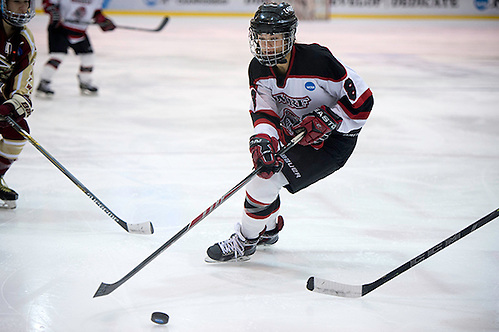
With a second-place finish last season and third-place finishes each of the two seasons before that, Wisconsin-River Falls has established itself as the program to beat from the west. Despite the fact that their conference (WIAC) does not receive an autobid to the NCAA tournament, the Falcons have earned themselves a spot each of the last six years.
Though a national championship is in reach — and likely a goal for every player on the roster — coach Joe Cranston said it’s not something he and his coaching staff focus on.
“If you do that, I think it’s a little overwhelming; we just try to get better every week,” he said.
Though Cranston said he also doesn’t like to look at previous years, it’s impossible not to compare this team to the ones that have been so successful in recent years. The Falcons’ 10-1 start to the season is the best they’ve had in years, and Cranston himself said he believes the current squad is playing better than the team did last year.
Wis.-River Falls had a stumble in mid-November — a 4-2 loss to Wisconsin-Eau Claire, but since then, they Falcons have won five straight. They’ve outscored opponents 28-3 in that stretch.
Of all the things Cranston has seen from his team already this season, it’s their response to that loss that has him most impressed — and excited for the rest of the season. The urgency and intensity the team has shown since that loss carried into the winter break. Where Cranston hoped to see players up-to-speed by midweek, they were there a day early. The team is focused and prepared to close out the season, one game at a time.
The Falcons are a grinding team. Cranston talked about his team outworking opponents multiple times. He described his coaching style and the team’s play as “lunch bucket.”
“We work hard, we’re disciplined, we’re respectful,” he said. “We play as a team. You’re only as good as how hard you work and you’ve got to make the players around you better. (Everybody) push(es) everybody and that’s a big part of our success. We’re not individuals.”
Though the Falcons have two of the top 10 scorers in the country in senior Dani Sibley and junior Carly Moran, they’re getting contributions up and down the roster.
Sibley and Moran alone account for half of the team’s goals through the first 11 games, but in those same 11 games, freshmen accounted for an additional 11 goals. That balance and depth are a large part of what has made Wis.-River Falls so successful. From top to bottom, their roster is contributing. They have two players who sit even on plus/minus. Every other player on the roster is in the plus.
Hard work is the cornerstone of everything Cranston and the Falcons do. He preaches it on and off the ice, and warns possible recruits that if they’re not willing to put in the work, they shouldn’t bother joining the program. The only end-of-year award given out is one voted on by the team that goes to the hardest worker on the squad.
It’s an incredibly simple coaching philosophy from Cranston, but it’s one that capitalizes on the blue-collar work ethic of a town like River Falls that’s just over the border in Wisconsin, but counts as part of the greater-Minneapolis/St. Paul metro area.
Though Wis.-River Falls has seen plenty of talented players fill the roster, Cranston focuses on the team as a whole and less on individual talent. The players all feed off of and improve each other. They put in the time and effort and the results have borne that out, especially in recent years.
Cranston keeps it so simple that he doesn’t even go as far as to set winning as one of team’s goals. Winning is just a positive byproduct of the work the team puts in.
“We’re going to outwork every team. We’re going to outskate every team. That’s our goal. Winning is never a goal. Winning is an outcome. We don’t go in saying we’re going to win a game. We need to win shifts. We need to win periods. We need to win the race. We need to win the battles on the boards. We break the game down. We keep it simple. I say that probably 20 times a day. Just keep it simple. We just try to play a simple game, not complicate it. Outwork teams. The end result of that will be winning games and having success.”


